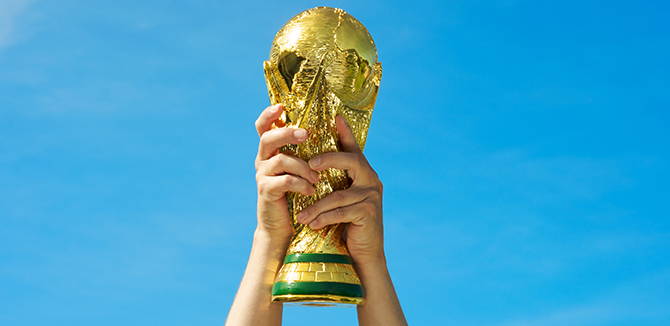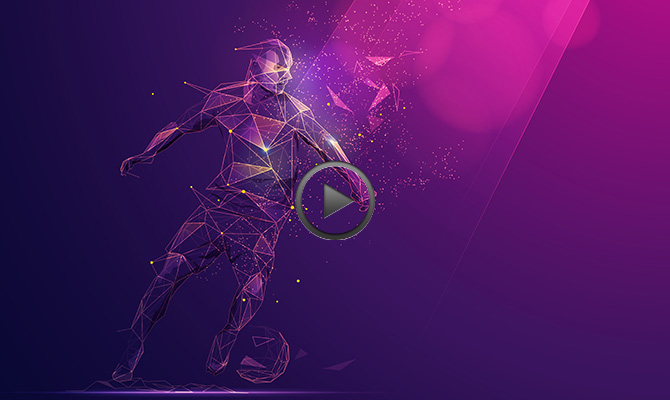Revolutionary AI at the World Cup
During the 2002 FIFA World Cup quarterfinals, Spain buried two soccer balls in the back of the net while attempting to knock out host nation South Korea.
Instead of a 2-0 victory, Spain was eliminated from the once-every-four-years tournament when both goals were disallowed on controversial referee decisions that FIFA officials later said were human error. South Korea advanced to the semifinals on penalty kicks.
Two decades later, as the World Cup is set to kick off in Qatar, the soccer ball itself is part of an elaborate artificial intelligence (AI) system designed to take human error off the table, at least when it comes to offside decisions — and there were multiple during that same Spain vs. South Korea contest.
The semi-automated offside technology will put AI in the spotlight at the global competition, and Mohammed Alam, deputy director of Northwestern Engineering's Master of Science in Artificial Intelligence (MSAI) program, will be watching closely.
“I can see a thousand reasons to be excited about this,” Alam said. “There’s so much possibility here. This is literally pushing the boundaries of what AI can do and opening up whole new fields.”
In the lead-up to the 2022 World Cup, FIFA announced AI will be used to detect if so much as a kneecap of a player is offside on a scoring chance. Each stadium used for the tournament will have 12 cameras dedicated to tracking up to 29 data points from each player 50 times per second. A sensor will also be placed inside the ball itself that will send data to the video operation room 500 times per second.
According to FIFA, AI will instantly produce an on-screen animation that details exactly where an offside violation occurred – or where it didn’t.
The technology is called semi-automated because it still relies on humans to look at the images compiled from all the data and verify the accuracy before notifying the on-field referee.
Alam said this step forward has the potential to revolutionize sports themselves.
“This is going to start a new phase in sports,” he said. “If you can put a sensor in a soccer ball and track so much data in a game that is so dynamic, you could do that with any other sport.”
Not only does the introduction of AI into the on-the-field action usher in a new path for the actual games, but its potential use in preparing athletes could be massive. Alam pointed to the use of technology that helped swimming star Michael Phelps analyze his every movement in the pool and helped him win 28 Olympic medals and become the most successful athlete in Olympic history – and that was in 2008.
"The thing that wasn't available back then was getting the data in real time," Alam said. "Now, you can put sensors everywhere and have cameras all over, so you can get more data than you’d know what to do with.”
Alam turned to basketball as an example. In recent years, the use of analytics has altered game play to include more three-point shots than ever before in the history of the National Basketball Association. In 2001, less than 15 percent of a team's shots were from beyond the three-point line. In 2011, the percentage rose to 22 percent. By 2020, the frequency of three-point shots ballooned to more than 39 percent.
Data analytics have been present in NBA and other sports for years, but the biggest challenge has been getting enough data in real-time. The World Cup is attempting to show that challenge is in the past. Accumulating so much information from the ball and every player on the field and using AI and predictive analytics could change the game as we know it.
A basketball player might have a killer crossover dribble that he relies on to beat defenders to the basket, but AI could eventually figure out what might be a more statistically successful play.
“There are many things that are going to elude humans,” Alam said. “AI is going to figure it out and say, ‘Why not do this instead?’”
Even how broadcasters announce a game could change dramatically as in-game data tracking advances. Alam imagined a scenario where as predictive analytics models get refined, data could indicate to announcers what pass will happen before it happens — allowing cameras to capture more captivating footage of key plays as they happen.
Despite the optimism, Alam also raised concerns of how AI could change sports in a way humans might not like – especially the athletes.
Suppose predictive analysis of soccer star Kylian Mbappe shows that, based on his movement, his skills will not be the same two years from now. What happens when Mbappe seeks a five-year contract that, absent AI, he would have received with no hesitation? “This step taken for the World Cup is both exciting and a little concerning,” Alam said. “I think the best word is ‘intriguing.’ We don’t really know where AI is heading, but the opportunities are vast, and I'll be watching the World Cup to see how it goes."



